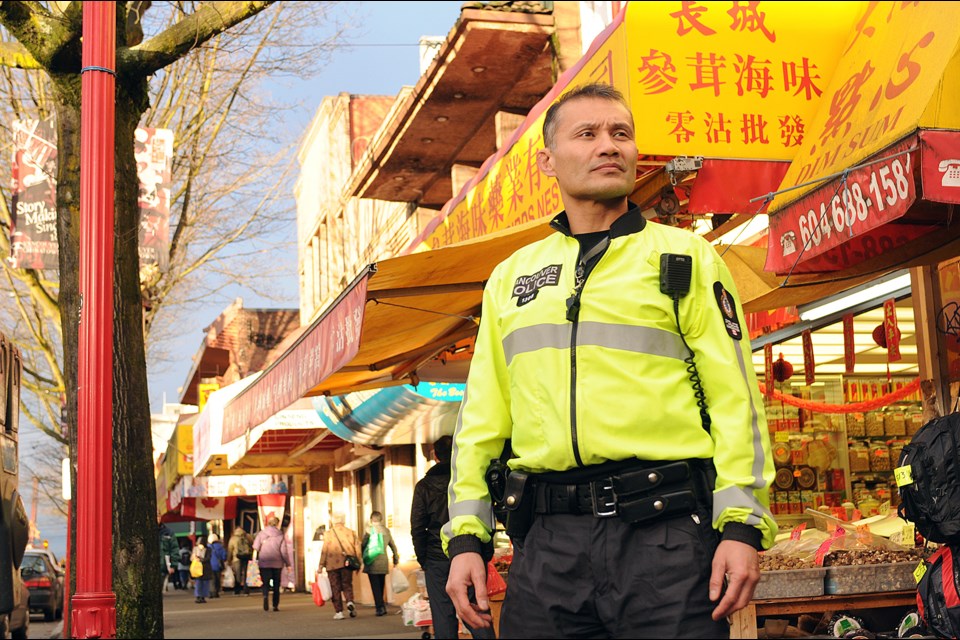If what a police officer keeps in his office gives any sense of who he is, then what to make of a poster of martial arts’ master Bruce Lee on a wall and the costume head of a lion on a desk?
Const. Wes Fung can explain.
First, what he does.
“I’m like an outreach officer for the VPD,” he said from his office at the Chinatown Community Policing Centre on Keefer Street.
For more than four years, Fung has worked as the neighbourhood cop for Chinatown, Gastown and is a liaison officer to six single-room occupancy hotels.
Unlike his colleagues on patrol, who are “run off their feet going from call to call,” Fung said his job allows him to spend more time getting to know people and discuss what’s on their minds.
“I have the luxury to sit down with merchants or community groups and listen to their concerns and issues and try to help them,” he said, noting property crime committed by people with a drug habit is the biggest concern for merchants and residents.
At 52, Fung is in his 29th year on the job and may retire next year. So this Sunday’s Chinese New Year’s parade in Chinatown could be his last as a cop … and, possibly, as a lion dancer?
Fung sat down with the Courier this week to talk about the VPD’s lion dance team (who knew?), his admiration for Bruce Lee (“my idol”) and his historical connection to Chinatown.
Why did you choose to work in Chinatown?
“I jumped at the opportunity because it was like coming back full circle. My great grandfather came to Chinatown in 1913, my grandfather in 1919 and then my dad in 1950 when he was 14 years old. And my wife’s family, we trace back to the turn of the last century. There’s a lot of history down here for me. So I thought it would be a great way to finish my career here in Chinatown.”
That history of Chinese immigration and struggle is captured right outside your office door at the Chinatown Memorial Square, where a monument was erected in November 2003 to remember the sacrifices of Chinese-Canadian soldiers and railway workers. What does it mean to you?
“When I look at the monument and I think of the history, if it wasn’t for the hardships and the sacrifices of those people and the people before them, I wouldn’t be a police officer right now. Everything I have, I owe to them and our history.”
I understand that history inspired you and another officer (Const. Randy Inouye) to form a Vancouver Police Department lion dance team.
“Our motto is honour our past, inspire the future.”
This will be the team’s ninth year at the Chinese New Year’s parade. From what I’ve seen of lion dances, the performances can be demanding.
“We’ll be taking turns. It’s tiring. I’m hoping for six of us, so three pairs of two. We’ll take turns rotating in and out of the lion because it gets quite hot and exhausting.”
Do you speak Cantonese or Mandarin?
“Very poorly. I speak the old village dialect. The guys who built the railroads spoke my dialect. It’s called yin ping. But you don’t need to be Chinese to be effective down here. I think for any police officer, the biggest asset is to be able to communicate, no matter what the language.”
I count one poster and two drawings of Bruce Lee in your office. Tell me about your connection to the martial arts superstar.
“I remember when I was 10, my parents told me and my brother to go get cleaned up because we were going to a movie. We showed up at the local Capitol Theatre and almost every Chinese family in Port Alberni was there. It was lined up around the block.
The movie was the Chinese Connection, starring Bruce Lee. I saw him up there on the screen, this ripped Asian guy and he was kicking ass. For me, that made a real impact because up until then, we always got our butts kicked in the movies and we were cast as negative stereotypes.”
In the time you’ve been on the job in Chinatown, the community has added new businesses and the area seems to be thriving more than it was a decade ago.
“I think it’s changed for the better. There’s a new energy coming back into the area. For years, Chinatown was in stagnation. You didn’t have the fresh blood like you did years ago where people came from villages to replenish. Those generations have died out and retired.
But new people are moving in, young families — it’s good to see. There’s a lot of competition with other Asian communities expanding, but what Chinatown has that places like, say, Richmond and other cities don’t have is a soul and a history and character.”



